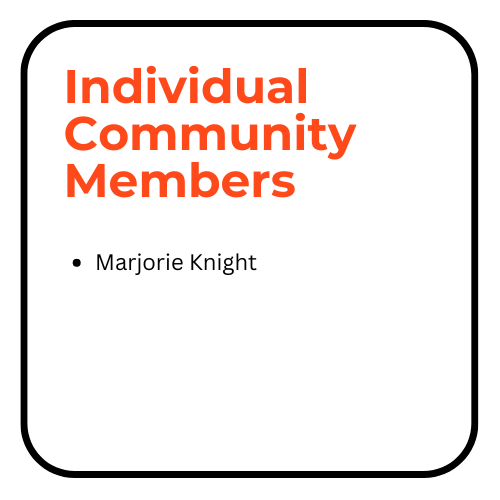OCTOBER 8, 2024
Our employment lawyer, Joanna Mullen appeared at Queen’s Park on Tuesday October 8, 2024 to provide submissions to the proposed law Bill 190. She updated Provincial Members of Parliament about the situation at Dutchie’s Fresh Market and why stronger laws are crucial to protect workers from wage theft.
We welcome you to read her submission.
If you want to raise this issue with your local member of provincial parliament (MPP), you can find your MPP using this website here.
CTV News link covered this in one of their news segment entitled ‘It almost sounds criminal’: MPPs react to Dutchie’s controversy as province drafts new employment laws.’ The segment can be viewed here.
Michael Renkema’s trial is scheduled for Tuesday, December 17 at 9:30 am at 77 Queen Street, Kitchener in Room 102. This is open to the public and all are welcome to attend.
august 7, 2024
As part of a network of local nonprofit organizations, leaders, academics and community advocates who are concerned about the growing women’s homelessness crisis unfolding in Waterloo Region – particularly in Cambridge – we have written an open letter regarding Women’s Homelessness in Cambridge and the Waterloo Region urging elected officials in the region to take action. We invite you to read the letter.


















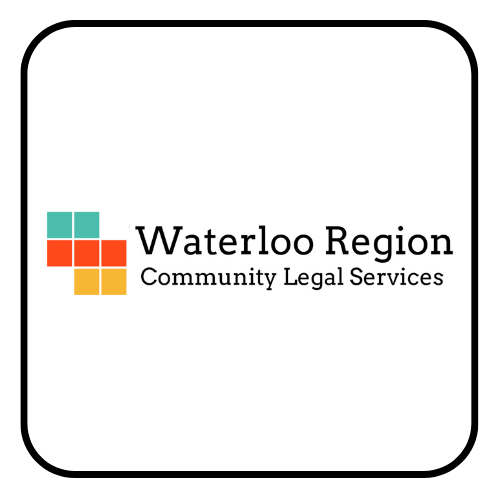



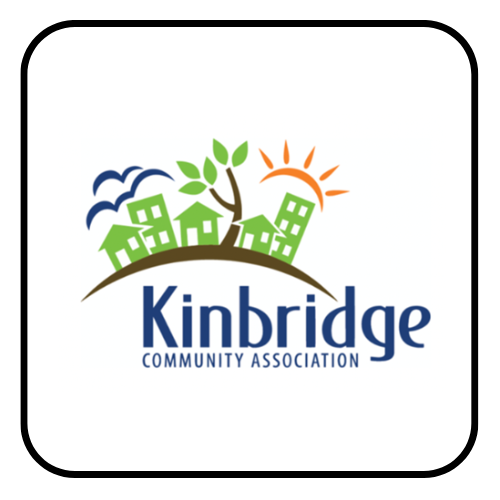
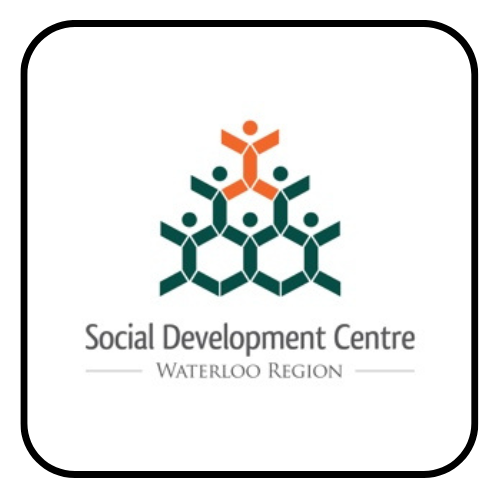
MAY 12, 2023
A joint press release with the Social Development Centre regarding the arrests of the local housing advocates following the April 27 protest at Willow River Park (Victoria Park).
MAY 12, 2023
A letter to the Mayor and Council at City of Kitchener regarding recent actions towards Roos Island Encampment Residents.
MARCH 30, 2023
A press release from WRCLS on the virtual rally – Emergency Action: Stop the Cuts to Uninsured Healthcare.
MARCH 29, 2023
In March 2020, the Ford government funded care for uninsured people. The provincial government plans to cut this program on March 31, 2023. Here is our statement on the government cuts to the life-saving healthcare program.
FEBRUARY 15, 2023
A Broken System Complicated by the HRTO:
Current Ontarian Human Rights at Risk
By: Asha Jeejeebhoy-Swalwell
The Community Legal Clinic of Brant, Haldimand, & Norfolk & Waterloo Region Community Legal Services
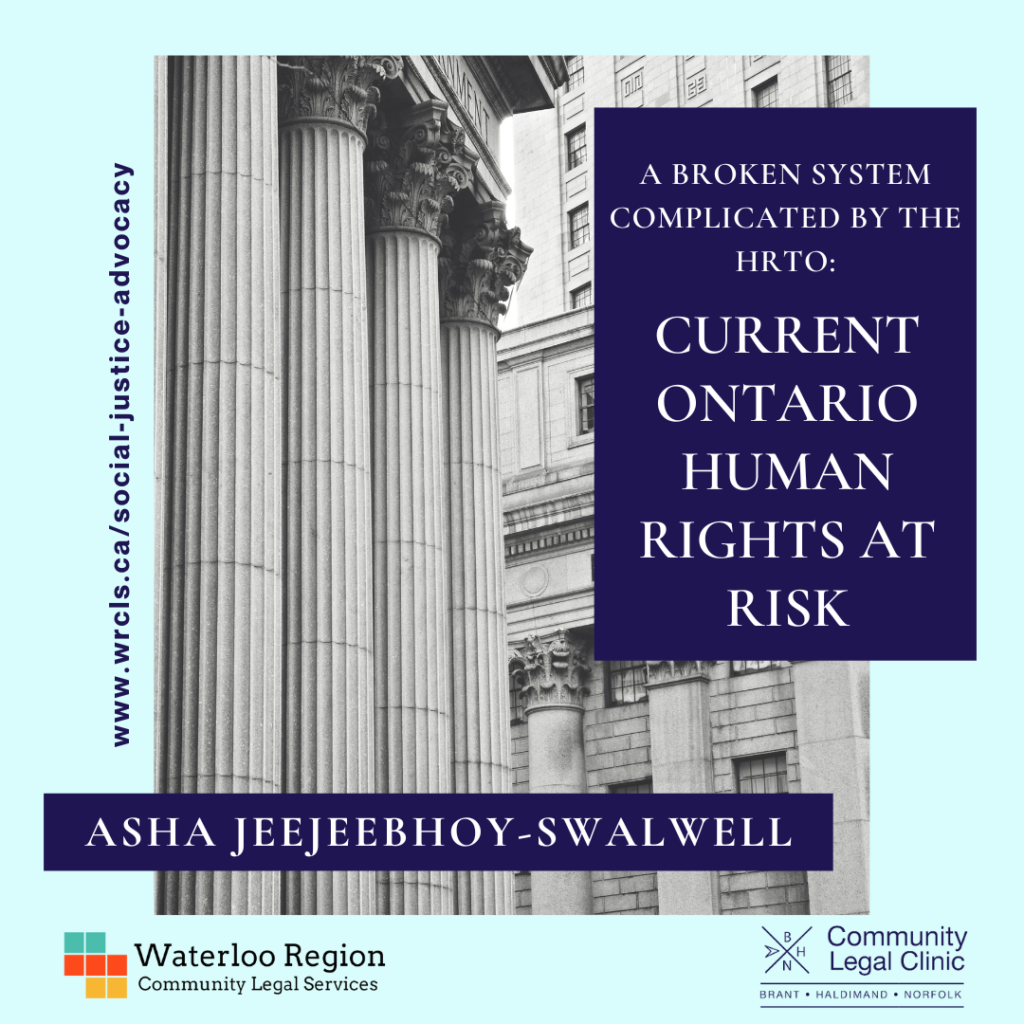
In Ontario, human rights are not being protected by the system designed to uphold them. Currently, the Human Rights Tribunal of Ontario (HRTO) has a backlog of 9,000 cases. In 2008, the human rights system in Ontario was redesigned to allow people to file complaints directly to the HRTO for adjudication. However, in recent years the system has been ill-supported to address ongoing human rights violations. As reported by Tribunal Watch Ontario[1], since the Ontario Government was first elected in 2018, they failed to re-appoint or retain most of the experienced adjudicators at the HRTO. Then they failed for several years to appoint a sufficient number of new adjudicators to fill the vacancies. This has resulted in unprecedented delays, leaving many individuals waiting months to years for their application to be addressed. Prior to 2021, the HRTO used to release over 100 full decisions annually, and now that number has gone down to only 16 annually.
In addition to these significant delays, there is an increase in the numbers of Notice of Intent to Dismiss (NOIDs) notices being issued by the HRTO. A NOID is a notice to the applicant that the HRTO is considering dismissing their application without a hearing because it does not have the jurisdiction to deal with the matter. This can include issues where for example, a matter involves an employer that is federally regulated, like an airline, and would have to be heard at the Canadian Human Rights Tribunal instead. It can also include more complicated issues, including when matters are filed at the HRTO more than one year after the last incident of discrimination or matters that “fail to identify specific acts of discrimination.” This means that applications are at risk of being dismissed without an oral hearing based on only a summary review of the adequacy of the written application and any subsequent written submissions. This leaves individuals that receive a NOID with no opportunity to have their experiences of discrimination in the workplace, housing, or other settings heard by the HRTO.
Francis Nasca, an Osgoode Hall student who completed their placement at the Human Rights Legal Support Centre, studied the HRTO’s growing reliance on NOIDs in 2021[2]. Nasca reported to the Law Times that “From 2009 to 2017, the tribunal would issue 150 to 300 NOIDs annually, and we saw 989 in 2021. The 989 represents 25 percent of applications received that year, so the numbers say this is happening on quite a large scale.”[3] Additionally, Nasca reported that the NOIDs were often based on questionable jurisdictional arguments without analysis of the actual claims and that applications based on race, colour, or citizenship violations were more likely to receive NOID notices.
Originally this system was designed to be easy to access for people without legal representation. Although now, it seems that people who do not have legal representation to either help with the initial drafting of the application or to help respond to a NOID are at risk of having their applications dismissed. This would be, for example, if they do not “properly” frame their experiences surrounding discrimination or provide enough detail at the outset. This result is that individuals without legal representation are expected to navigate a system of justice that has now become inaccessible to them.
It is also common for applicants to receive little-to-no response from the HRTO prior to receiving a NOID. Self-represented applicants are often confused about the content of the NOID issued by the HRTO and what they can do about it. A staff lawyer at the Black Legal Action Centre explained that clients are often in a “panic over the phone as to why the tribunal has dismissed their case without the respondent having a chance to respond or without any hearing from them.”[4] The fairness of the process is being questioned as it leaves applicants feeling undermined by the legal system, the very same system they are seeking justice from.
Many advocates have expressed concerns over the current state of the HRTO and other tribunals in Ontario. They are questioning whether these tribunals can continue to meaningfully provide access to justice for Ontarians. Specifically, concerns include how systems have become high-barrier for marginalized people, partly due to the Covid-19 pandemic restrictions that affected these systems. For example, the use of technology and remote access to justice may not be affordable or accessible for vulnerable populations of individuals. Unfortunately, the reformation of the human rights system in Ontario that was completed over a decade ago, which intended to create a direct-access system with in-person oral hearings that were very simple and straightforward, has now become increasingly difficult to navigate for individuals and lawyers.
These unnecessary delays and an increasingly complicated process limit the ability of marginalized people, especially those living in poverty, to access justice meaningfully. The high-barrier access to justice at the HRTO is not fair, cost or time- effective like it was designed to be. The human rights of Ontarians are at risk until a solution to these delays and dismissive attitudes are adjusted to meet the needs of each individual fairly and without oppression.
[1] https://tribunalwatch.files.wordpress.com/2020/05/statement-of-concern-may-14.pdf
[2] https://www.cba.org/Sections/Administrative-Law/Resources/Resources/2022/AdminEssayWinner2022
[3] https://www.thestar.com/opinion/contributors/2023/01/11/ontarians-human-rights-are-at-risk-because-the-system-designed-to-protect-them-is-broken.html
[4] Ibid.
FEBRUARY 8, 2023
On February 8, our staff lawyer, Steven Caswell, delegated at the Regional Council Meeting to speak on the Regional Budget process that is underway. Steven advocated for the direction of funding towards affordable housing initiatives. Given the current housing crisis and research on the social determinants of health, our position is that communities will benefit greater from affordable housing as opposed to policing.
Here is an excerpt from Steven’s delegation!
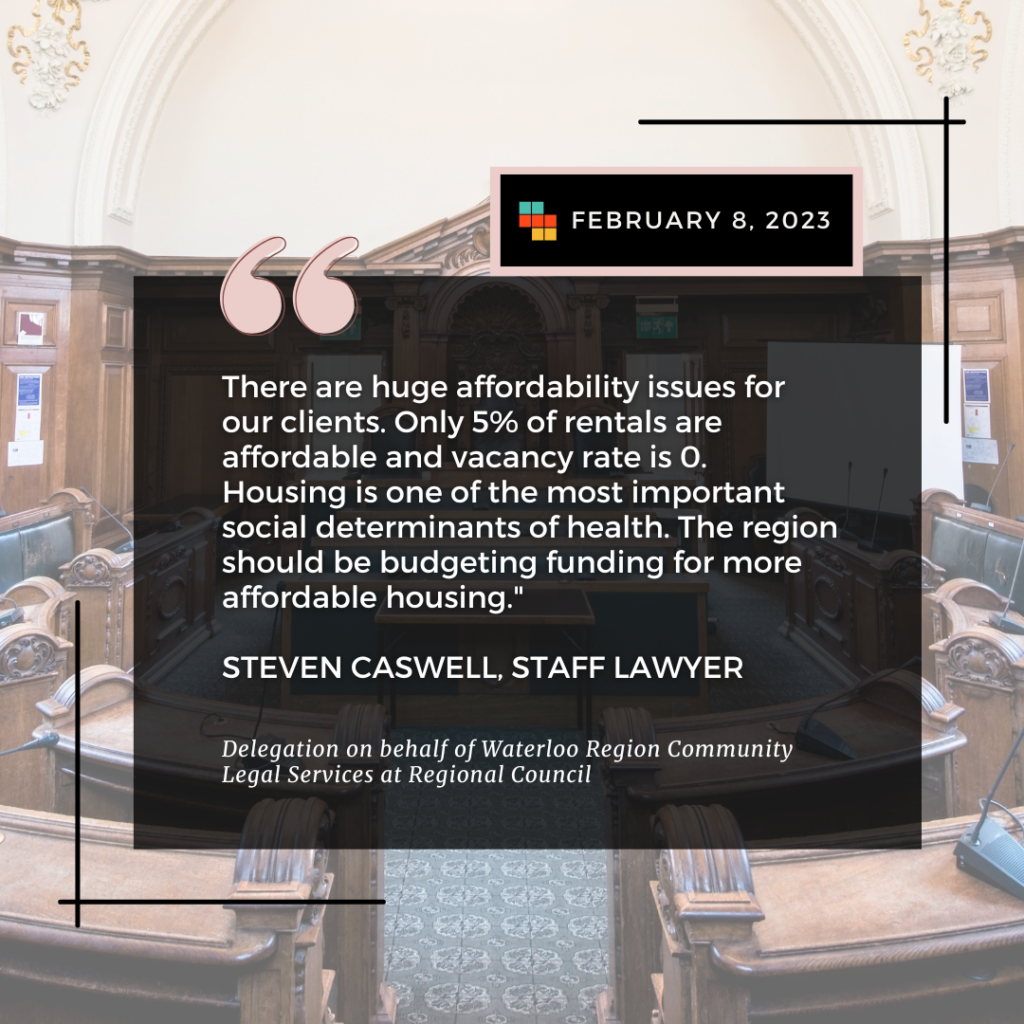
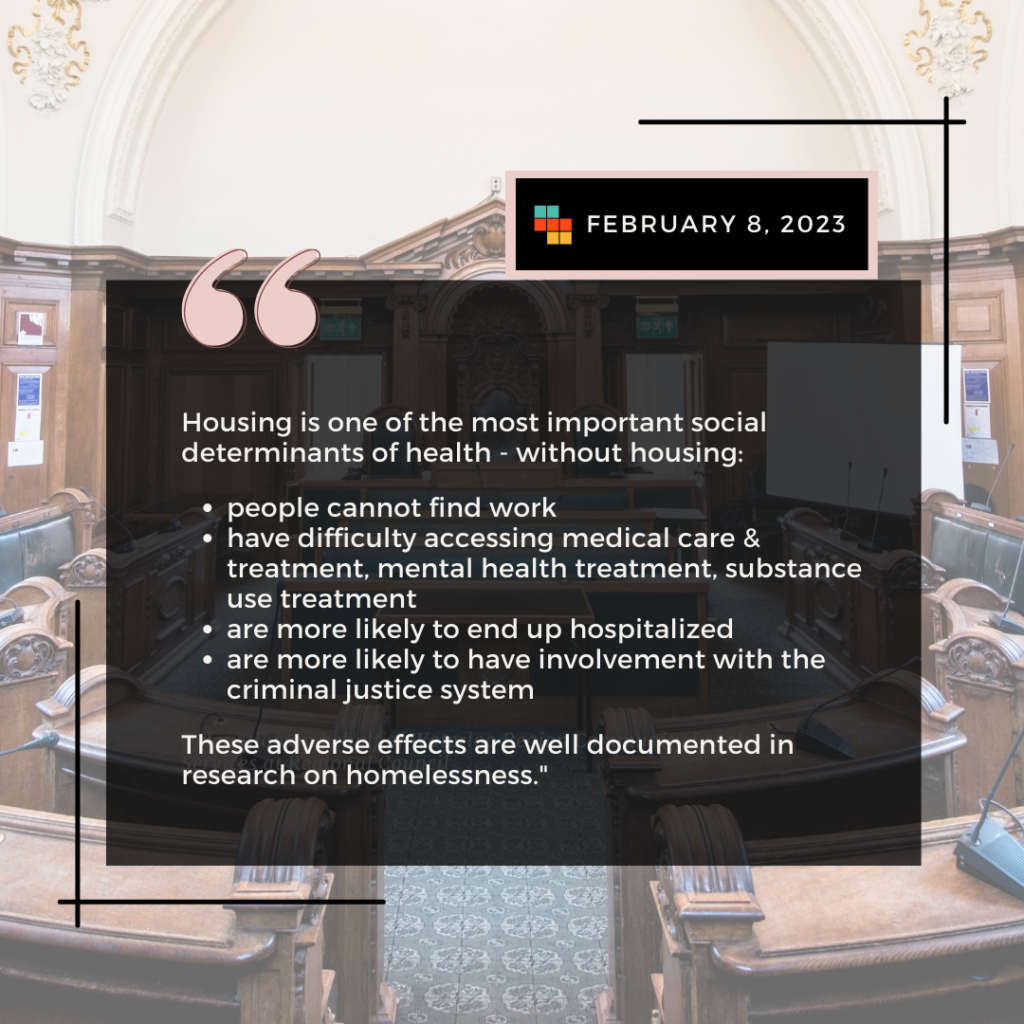
JANUARY 27, 2023
On Friday, January 27 2023, Justice Michael Valente ruled that the region’s “bylaw violates section 7 of the Charter in that it deprives the homeless residents of the encampment of life, liberty and security of the person.”
This is a significant precedent as it is the first Ontario decision to hold that encampment evictions violate section 7 rights under the Charter.
We want to thank everyone who stood with us in support of our unhoused neighbours.
We hope that the Region and other governments will move forward with thoughtful remedies to address the homelessness crisis. We hope to see the prioritization of safe, dignified, and healthy alternatives to encampment evictions. We hope to see the Region and other governments actively engaging with service providers, advocates, and social organizations – and more importantly, with the directly affected communities – when making decisions about low-income and affordable housing plans.
We hope to see the life, security, and liberty of individuals experiencing homelessness protected. Lastly, we hope to see people treated with compassion, dignity, and respect.
JANUARY 23, 2022
Upon learning about the City of Kitchener’s notices to remove tents from the encampment at Victoria Park, our staff lawyer Ashley Schuitema wrote a letter to encourage the City of Kitchener to actively engage with the residents at the encampment, or any other encampment across the city, before taking steps to remove any tents from the encampment.



